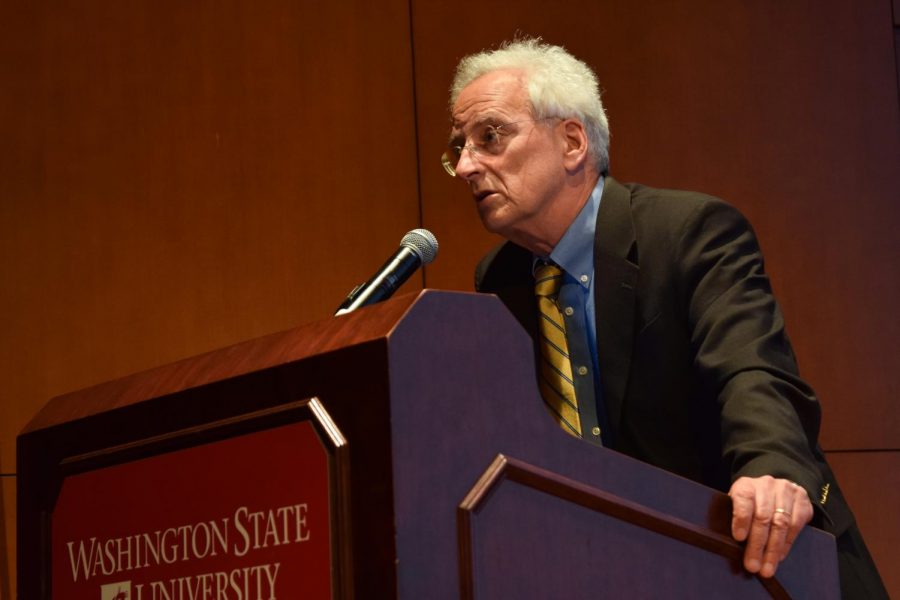Sports economist tackles problematic NCAA money race
Speaker outlines scandals, over-evaluation of college coaches
JOSEPH GARDNER | THE DAILY EVERGREEN
Sports Economist Andrew Zimbalist says college basketball and football coaches are overpaid, and college athletes should be compensated Thursday at the CUB.
March 28, 2019
The Foley Institute hosted Sports Economist Andrew Zimbalist to speak about the problematic money race occurring in college sports across the NCAA, citing coach salaries among the reasons some college sports see major deficits.
Zimbalist emphasized the large amounts of money invested into college athletics and the focus put on sports programs by university administrations. Universities have continued to dump large sums of money into their athletic programs with the hope of gaining competitive advantages over other programs around the country.
He identified a variety of scandals that were symptomatic of a system that places a heavy priority on winning.
Zimbalist outlined scandals such as the FBI uncovering of universities that were paying priority athletes under the table to play for their team.
He said the median operating deficit for athletic programs in the Football Bowl Subdivision is $14 million, with maybe half a dozen programs that actually generate surplus revenue.
College athletic programs operate under a different model than a traditional business, Zimbalist said. A regular business has the goal of generating profits to please the stockholders. He said athletic programs do not have the direct objective of taking in revenue, and instead of stockholders, they have stakeholders.
“[Stakeholders] are not looking for profits,” Zimbalist said. “They want victories, they want wins.”
He said universities are always willing to build a new stadium or renovate athletic facilities because these investments attract the best athletes to their programs, as well as the best coaches.
“A school needs the top coaches to get the top players,” he said.
Zimbalist pointed out that college coaches for sports like football and basketball are often the highest-paid state employees. At schools like WSU, some coaches are paid far more than the highest-paid academic officer at the university.
Zimbalist said the cost of college coach salaries is overinflated as they are part of what he calls an “artificial market.” He calls the coaching job market artificial for a few reasons.
He said the value of coach salaries is overpriced, as they are paid at rates comparable to NFL coaches even though the NFL generates three to four times more revenue than college sports.
He also demonstrated the over-evaluation of college coaches by pointing out that if a cap was placed to lower coach salaries across the NCAA, many coaches would not leave their position. Their next best option would be to coach at a lower level like Division 2, Division 3 or even high school, none of which would pay better, even after the salary reduction.
Zimbalist said college coaches are essentially paid for the labor of the athletes they coach.
“Coaches are being paid for the value that players create,” he said.
Zimbalist estimated that for a team that generates $150 million in revenue, an individual player was likely drawing value at well over $1 million. Yet athletes are only compensated through scholarships, grants and aid, and cost-of-attendance allowances.
He said in recent history there has been a movement among athletes to change their situation through a number of strategies, like attempted unionization, but primarily through antitrust litigation against the NCAA.
He said antitrust lawsuits calling for more stipends and compensation for student-athletes are brought against the NCAA on a yearly basis, and these lawsuits are costly.
Zimbalist suggested policy that would conditionally exempt the NCAA from these antitrust lawsuits in exchange for better accommodation for student-athletes and a focus on academic integrity. He suggested benefits for athletes like health insurance, which most universities do not offer to their athletes.
He said there has been increasing congressional interest in solving this issue as costs for academic programs continue to rise, deficits increase and student-athletes continue to be abused.
Zimbalist said it will take collective pressure on legislators from university trustees and presidents to resolve this issue.









